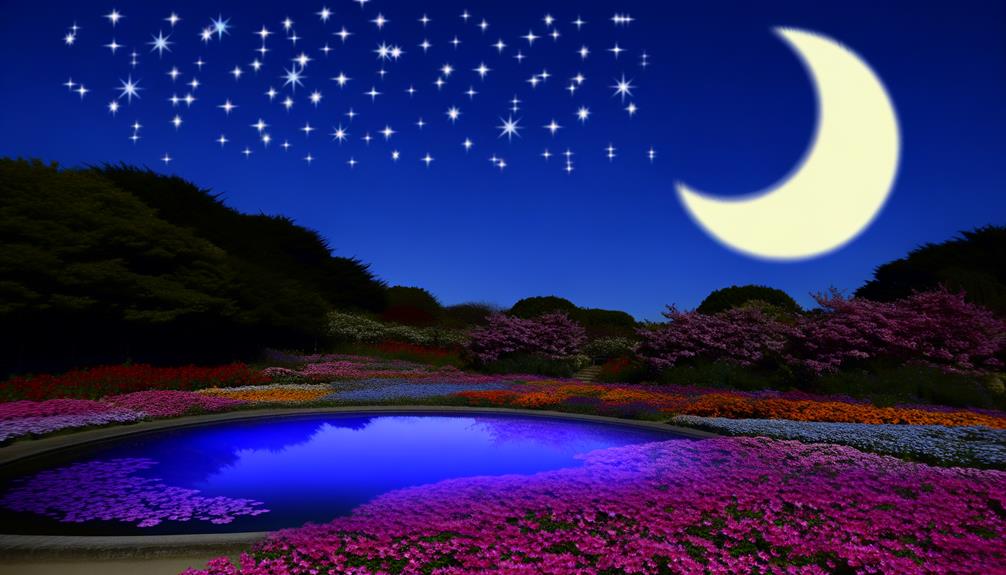Zohra Name Meaning in English
The name Zohra, derived from Arabic culture, translates to 'flower' or 'blossom' in English, symbolizing beauty, purity, and celestial themes. Historically, it carries cultural significance across Middle Eastern civilizations including Persian and Hebrew influences, and is often associated with beauty and grace.
In Arabic-speaking countries, Zohra is revered for its celestial and aesthetic connotations, and it appears frequently in literature, music, and visual arts. Modern usage of the name spans globally, admired for its melodic sound and rich heritage.
Prominent figures like Zohra Sehgal and Zohra Drif contribute to its timeless appeal. Discover more about its enduring impact and notable bearers.

Key Takeaways
- Zohra means 'flower' or 'blossom' in Arabic, symbolizing beauty and radiance.
- The name originates from Arabic culture with significant historical and Islamic ties.
- Zohra represents purity, grace, and celestial themes in Arabic-speaking communities.
- Famous bearers include Zohra Sehgal, Indian actress, and Zohra Drif, Algerian freedom fighter.
- Modern usage spans globally, reflecting its melodic sound and cultural richness.
Origin of Zohra
The name Zohra finds its origins in Arabic culture, where it is historically and culturally significant. Stemming from the rich tapestry of Arabic heritage, Zohra has been a prominent name for centuries. Its roots can be traced back to early Islamic history, where names carried profound meanings and were often chosen with great care.
The name Zohra has been borne by various notable figures, enhancing its cultural resonance. In Arabic literature and poetry, names like Zohra are imbued with symbolic significance, often reflecting beauty, purity, and celestial themes. This historical context underscores the name's enduring appeal and importance in Arabic-speaking communities, where it continues to be a cherished and respected choice for naming.
Linguistic Meaning
Building on its rich historical and cultural roots, the name Zohra linguistically translates to 'flower' or 'blossom' in Arabic, symbolizing beauty and radiance. This translation is deeply embedded in the Arabic language, where flora often represents elegance, importance, and renewal.
The use of botanical terms in names is a common cultural practice in many Arab societies, reflecting a deep appreciation for nature's aesthetic and life-sustaining properties. Zohra, as a name, consequently carries connotations of purity and grace, echoing the natural world's splendor.
This linguistic association underscores the cultural significance of names in conveying personal qualities and societal values, providing a meaningful layer to the understanding of Zohra beyond its mere phonetic composition.
Historical Significance
The name Zohra boasts ancient cultural roots, tracing back to early civilizations where it was often associated with beauty and brilliance.
Over centuries, its etymological evolution has seen variations across different cultures and languages, enriching its historical narrative.
Importantly, several famous historical figures bearing the name Zohra have contributed to its enduring legacy and cultural significance.
Ancient Cultural Roots
Tracing back to ancient times, the name Zohra carries significant cultural and historical resonance, particularly within Middle Eastern and North African civilizations. Rooted in the rich tapestry of Islamic, Berber, and Ottoman histories, Zohra has been emblematic of beauty, brightness, and celestial significance. This multifaceted name has transcended mere nomenclature, embedding itself into various cultural narratives and practices.
| Civilization | Historical Significance | Cultural Impact |
|---|---|---|
| Islamic | Associated with Venus | Symbol of beauty |
| Berber | Linked to local legends | Emblem of brightness |
| Ottoman | Used in royal courts | Denotes celestial grace |
| Ancient Arab | Rooted in poetry | Celebrated in literature |
These historical connections underscore Zohra's enduring relevance and profound cultural footprint, resonating through centuries.
Etymological Evolution
Zohra's etymological evolution reflects a confluence of linguistic influences from Persian, Arabic, and Hebrew, each contributing layers of meaning and historical depth to the name.
Historically, Zohra has been linked to various cultural and linguistic shifts, symbolizing beauty, brightness, and celestial elements.
- Persian Influence: In Persian, Zohra is associated with Venus, the planet symbolizing beauty and love.
- Arabic Origin: In Arabic, the name Zohra means 'flower' or 'blossom,' highlighting natural beauty.
- Hebrew Connections: The Hebrew translation often relates Zohra to light and dawn, signifying new beginnings.
- Islamic Tradition: In Islamic texts, Zohra is sometimes linked to celestial beings.
- Historical Usage: The name has been prevalent in various historical periods, often reflecting societal values of beauty and purity.
This multifaceted heritage enriches the name, making it a timeless choice.
Famous Historical Figures
Building on its rich etymological roots, Zohra has been borne by numerous influential figures throughout history, each adding layers of cultural and historical significance to the name.
A notable example is Zohra Sehgal, an iconic Indian actress and dancer whose career spanned over seven decades. Her pioneering work in both Indian cinema and international films highlighted cultural exchanges between East and West.
Another historical figure is Zohra Drif, a prominent Algerian freedom fighter and lawyer, whose contributions to the Algerian War of Independence against French colonial rule are well-documented.
These figures not only exemplify the name's widespread appeal but also its association with resilience, creativity, and cultural bridging, underscoring its enduring legacy across different contexts.
Cultural Impact
The name Zohra has experienced varying degrees of popularity across different regions, often reflecting local cultural and historical contexts. Its influence can also be seen in the arts, where it frequently appears in literature, music, and visual arts, symbolizing beauty and brilliance.
This cultural prominence underscores the name's enduring legacy and multifaceted significance in diverse traditions.
Popularity Across Regions
Examining the cultural impact of the name Zohra reveals its varied popularity across different regions, deeply influenced by historical and sociocultural factors.
In Arabic-speaking countries, Zohra is revered due to its celestial connotations linked to the planet Venus.
Conversely, in South Asia, the name's prevalence owes much to its connection with Islamic traditions and historical figures.
Regions in North Africa also reflect a rich tapestry of cultural reverence, where Zohra symbolizes beauty and purity.
- Middle Eastern Influence: Strong historical and religious resonance.
- North African Tradition: Symbolism tied to beauty and purity.
- South Asian Prevalence: Deep roots in Islamic culture.
- European Recognition: Limited, often linked to migration patterns.
- Global Diaspora: Varied popularity due to cultural integration.
This examination underscores Zohra's multifaceted cultural significance.
Influence in Arts
A significant influence of the name Zohra in the arts can be traced through its representation in literature, music, and visual arts across various cultures. Historically, the name has been associated with beauty and celestial themes, inspiring countless artists. In literature, Zohra frequently appears as a symbol of purity and inspiration. Musicians have drawn upon its ethereal connotations to create evocative compositions, while visual artists have depicted it in works that emphasize grace and elegance.
| Artistic Domain | Notable Example |
|---|---|
| Literature | "Zohra" by Nobel Laureate Naguib Mahfouz |
| Music | "Zohra" by Algerian singer Cheb Khaled |
| Visual Arts | Persian miniatures featuring Zohra |
| Film | Zohra in Bollywood cinema |
| Theater | Zohra in traditional Arabic plays |
These instances highlight the name's enduring cultural significance.
Famous Namesakes
How has the name Zohra been immortalized in history and culture by its notable bearers?
Zohra has graced various arenas, from arts to activism, reflecting its rich cultural tapestry.
Historically, the name Zohra carries profound significance, often associated with luminaries who have influenced their fields.
- Zohra Sehgal: An iconic Indian actress and dancer, celebrated for her contributions to both Indian cinema and British theater.
- Zohra Drif: A prominent Algerian freedom fighter, renowned for her role in the Algerian War of Independence.
- Zohra Lampert: An American actress known for her impactful performances in film and television.
- Zohra Aghamirova: A distinguished Azerbaijani rhythmic gymnast, exemplifying excellence in sports.
- Zohra Bensemra: A lauded Algerian photojournalist, capturing compelling narratives across war-torn regions.
These individuals underscore the name Zohra's enduring legacy and cultural resonance.
Modern Usage
In contemporary times, the name Zohra continues to be embraced across various cultures, symbolizing a blend of historical depth and modern relevance. This name, rooted in Arabic origins meaning 'flower' or 'blossom,' has been adopted globally, reflecting a multicultural appreciation. Its usage spans diverse regions, from the Middle East to Western countries, showcasing its adaptability and timeless appeal.
Historically, Zohra has been associated with beauty and grace, traits that remain significant in today's naming conventions. In modern contexts, Zohra is often chosen for its melodic sound and cultural richness, appealing to parents seeking names with deep, meaningful backgrounds. This enduring popularity underscores Zohra's ability to transcend time, maintaining its significance in a rapidly evolving world.
Conclusion
To wrap up, the name Zohra, rooted in Arabic and Persian cultures, holds a diverse array of meanings and historical importance. From linguistically representing 'flower' or 'Venus,' it has flourished over time, making a lasting impression on literature, art, and society.
The cultural influence of the name is clear through its well-known individuals and ongoing contemporary adoption, representing beauty and intelligence. Similar to an everlasting tune, Zohra reverberates through generations, reflecting its lasting impact on various societies.






